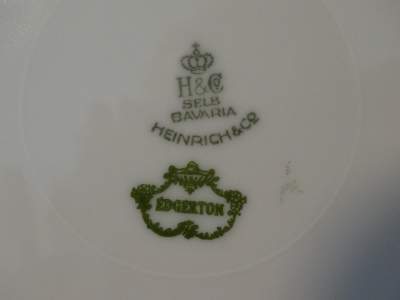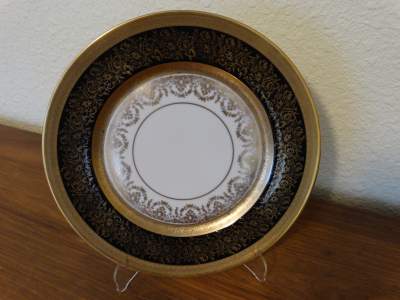Thanks for more interesting facts I would never have thought about !!
Most people here in the U.S. have no idea of the number of patterns both named and not that even one mfr can make during their time !! The most common question asked is “What is this pattern name” ?
If I had a memory like that I guarantee that you would find me in a casino somewhere !!
Now enjoy your coffee !!
[quote]Interesting Chris !! Didn`t know all that !![/quote]
Ah, the “name game” of German makers could fill a book of its own. Take the [i]Edelstein[/i] factory for example which indeed actually named quite a few patterns. The formerly Jewish-owned factory had struck a post-war deal with the Allied Occupation Forces and provided goods for the US PX and UK NAAFI stores. As the soldiers were used to pattern names from home, the company started to add names.
German manufacturers normally avoided that as the names would have to be registered/copyrighted at the foreign market location, which meant an increased personal and financial effort which they avoided by leaving the naming (plus paperwork and fees) up to importers and distributors.
The [i]Edelstein[/i] goods however were sold inside German borders, even if the barracks and military installations were officially non-German territory. So German trademark (but not tax) laws applied, allowing the company to easily register all their designs in bulk applications. If servicemen took the items home (“exported” them), the validity of the trademark and name registration was not affected as the items had been officially created for the domestic market and sold *in* Germany. The only additional reference towards the applied tax status were the applied large V’s found on many items.
Sticking with [i]Edelstein[/i] and their [i]Maria-Theresia[/i] body type, there are multiple flaws in their naming lineup. For example there are two patterns officially named [i]Victoria[/i] (16845 and 21987) and two named [i]Florence[/i] (18019 and 21613), just to name two examples that constantly throw off sellers/buyers … ;).
You can probably guess why I turn down all requests when it comes to “naming” patterns. I just can’t be bothered to run up against windmills, telling people that pattern names in context with German manufacturers are more than useless because most “official” names are exactly NOT official and may vary across the globe (sometimes even between US East- and US West-Coast).
But enough for now, I need more coffee !!!
[b]Heinrich & Co.[/b] merely named the body forms. They used numbers for the patterns and left naming to importers and retailers. Good example is the well-known body form [i]’Grazie'[/i], which was available with pattern 17659, 17664, 17689 or 17977. Hold in mind that these four examples are known under over fifteen different names worldwide, depending on who the retailer was and were he was located. People should finally forget the myth of “original” and “true” pattern names.
In your case, [i]Edgerton[/i] is a [i]series[/i] name, but [u]it is not an original [b]Heinrich[/b] ![/u]. The decoration was created (and applied) in the US for [i]Marshall Fields & Co.[/i]. The [i]Edgerton[/i] series was (as far as I know) available based on green (mint), red, ivory (cream) and ebony (black), all with different decoration forms (with or without central floral, different gilding templates, etc.).
The [i]Edgerton[/i] series is commonly said to have been made [i]”around 1900″[/i] which is utter nonsense as the clearly visible [i]Heinrich[/i] mark was only introduced 1931 (registered at the Reichswarenzeichen-Register on February 23rd 1931 as Reg.#429 574).
—
That aside, additions like “Warranted 22k Gold” and such were often used by US decorators who liked to brag about the obvious. The only real difference between 14kt, 18kt or 22kt decorations is the look/appearance, it has nothing to do with overall quality of a decoration or set value. In fact a well-applied 14kt gilding can look way better than a cheaply applied 22kt gold template.
On the other hand, if you see a German item with a “Warranted xxkt Gold” addition you know for sure that some US studio (re)decorated it. Quite handy if you do not have other obvious proof that a decoration is not original
https://www.google.com/?gws_rd=ssl#q=heinrich+co+selb+bavaria+edgerton
Did you try looking under the pattern name ?? Here are some different colors in that pattern !!
Could be 22K or 24K but that does not add to the value !! Its a miniscule amount !!
Value about $20. !! And yes you can find Heinrich dinnerware in many price ranges !! With no bidders, no watchers, nothing at all !! And that is how you establish a value for most things,, seeing what a person or persons are willing to pay for a given item !! The asking price is irrelevant,, it the getting price that counts !!




